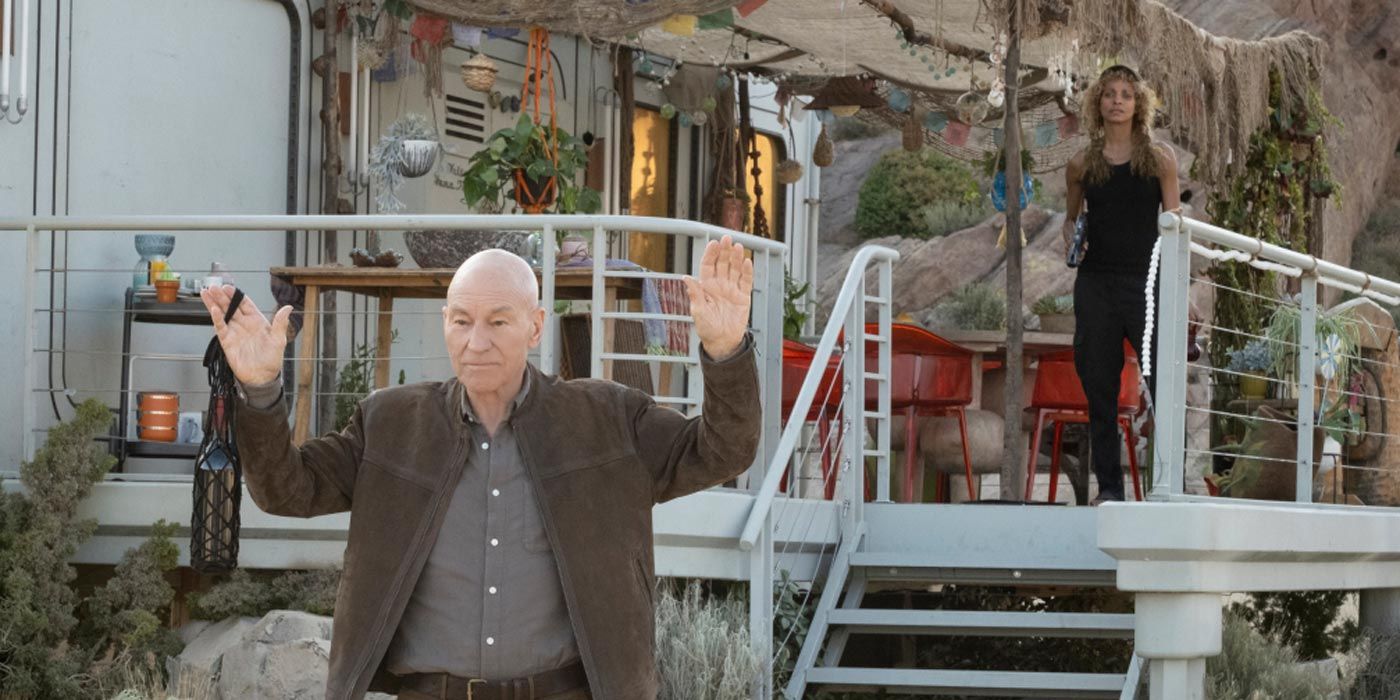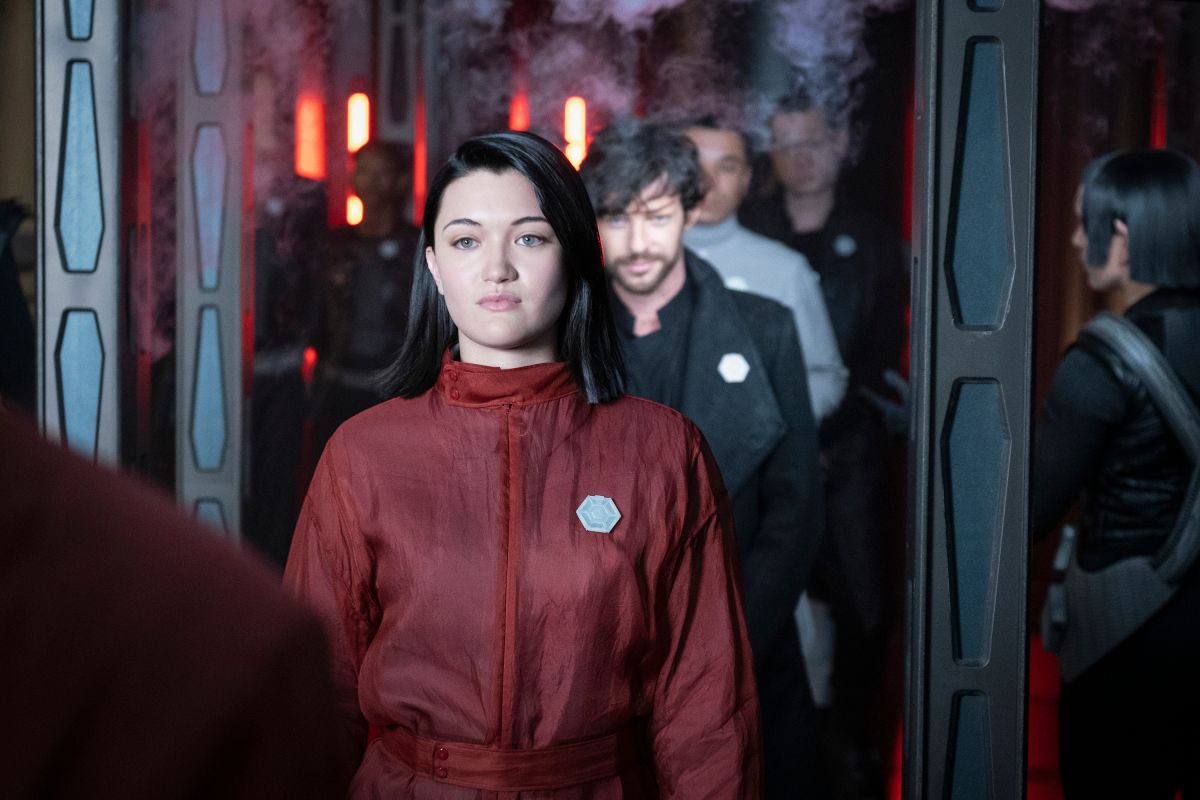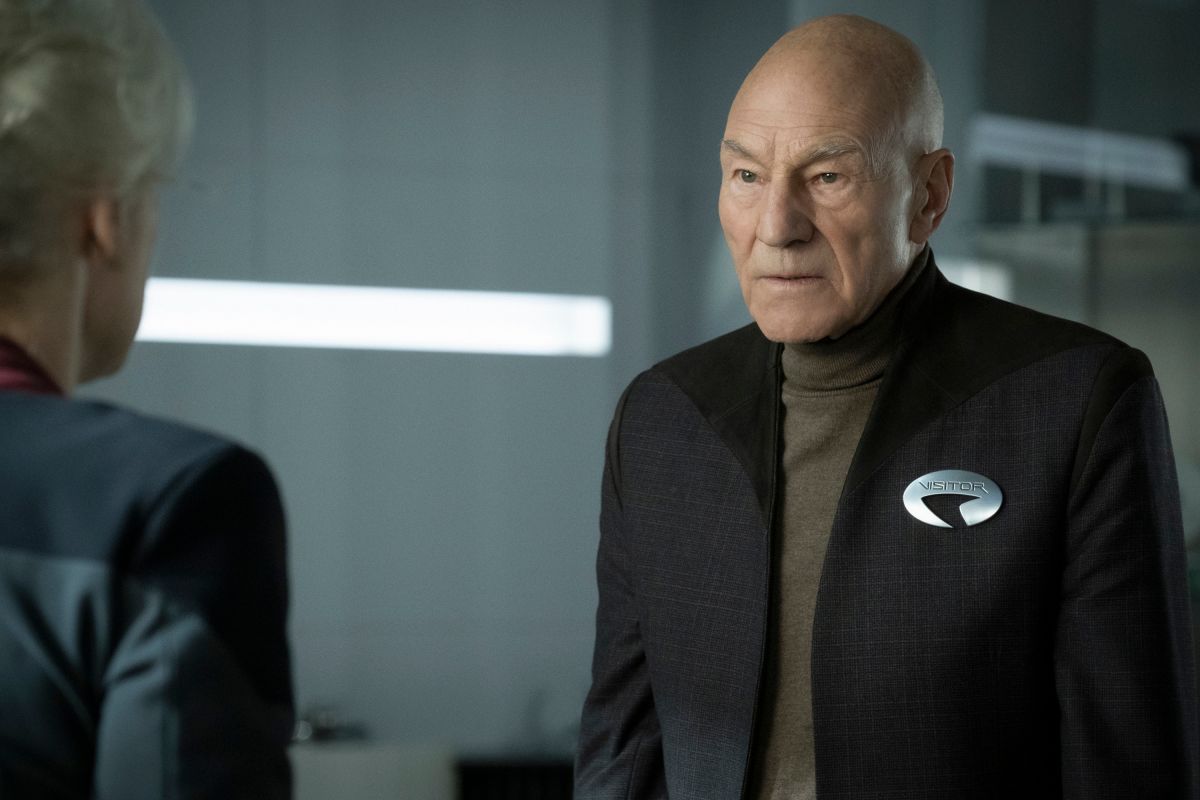WARNING: The following contains spoilers from "Maps and Legends," the second episode of Star Trek: Picard, now streaming on CBS All Access.
Star Trek: Picard had perhaps the highest stakes of any series in franchise history. Bringing back a fan-favorite character -- Patrick Stewart as Jean-Luc Picard -- for the first time in nearly 20 years for a new show is a high bar to clear. On top of that, you have to provide a situation that both satiates those who have been obsessive with Picard's adventures for years, but still create a story that makes it feel like a new adventure rather than a reboot. Understandably, it's a lot of pressure.
And no one's felt that pressure more than Hanelle Culpepper, who directed the first three episodes of Picard. This certainly was not her first foray into Trek, having previously directed two episodes of Star Trek: Discovery. But Culpepper, who has also directed episodes of The Flash, Gotham and Criminal Minds -- the latter of which landed her a NAACP Image Award for Outstanding Directing in a Drama Series -- had some extra attention going in. She's gone where no woman has gone before, the first female director of a Star Trek pilot. But considering the critical success of Picard so far, the record-breaker can raise a glass of Chateau Picard in pride.
Culpepper talks with CBR about her initial approach to Picard, working with Patrick Stewart, how she starkly differentiated life on Earth and on the Borg cube, and her reaction to the internet reception.
CBR: What was your initial reaction when you were asked to direct the first installments of Star Trek: Picard, considering the anticipation behind Picard's return?
Culpepper: When I was first approached, I didn't quite believe it. I figured they wanted to meet with me because I had worked with Star Trek, but I just knew they weren't going to hire me. I figured Alex Kurtzman or Akiva Goldsman would do it. I went into it as prepared as I could be, but with low expectations. So each time I would get another interview, it started to dawn on me that this might actually happen. It's like how I felt when Obama was first running for president! (Laughs.) Then once I actually got it, I was so honored, pleased, and excited to be a part of it. But I was also nervous. People have high expectations, and you want to meet and exceed those expectations.
When you were preparing to go into Picard, what were your initial concepts? Did you look to any previous material as inspiration?
It was a lot of looking at previous episodes of The Next Generation, a lot of my favorite ones. I love ["The Inner Light"], where Picard lives a whole life as part of another planet. I wanted to bring texture from those episodes. I'm also not a person who has an encyclopedic brain for all the TNG episodes. So I needed to re-watch stuff so I could remember. I had some memories and emotional connections to a lot. I wanted to get the details right. Every decision I made was based on, "What have they done before? What makes sense? What serves the story we're telling now?'
For the visuals, I wanted it to feel like a different show than Discovery. I wanted it to feel like its own show, like it's an off-shoot of TNG. I went for different colors, different chasing, different editing patterns, different camera movement. Those were all reflecting what I felt Picard's emotional state and life was at that moment.
You just mentioned editing patterns, and I wanted to draw attention to the sequence in episode 2 that alternates between Picard and Laris investigating Dahj's apartment, while also talking with Zhaban at the chateau. I can't recall another sequence in Trek history that was as uniquely edited as that. What was the inspiration behind it?
That was tricky. When I got the scene, I saw all the talking. I really wanted to keep it moving, and that was obviously easy to do in an apartment where they needed to explore. It wasn't too easy in Picard's study, when they're simply looking at monitors. I tried to give movement where I could. But I have to tell you, when I did my cut, I didn't cut the scenes together. I cut some dialogue out because I wanted to whittle down to what the audience needed to hear. Because it's a lot of information. Alex Kurtzman actually came up with the brilliant idea to intercut between those two scenes. I thought it was a really effective way to combine two scenes with lots of dialogue. And I ended up using that intercutting in a scene that got used in episode 3.
Episode 2 divides the action between Earth and the Borg cube. What choices did you make to make those feel like two different spaces?
We wanted a different feel for Earth versus space. The camera movement is part of it. When we're in space, it's more steady cam. That gives a little more of a "floaty" feeling to it. When we're on Earth, there's a lot more handheld. It gives more grit and shows him trying to escape this life he had created for himself. I love warm colors, and I feel like a lot of shows use cooler colors. Discovery feels like a cooler show to me. The colors of fall reflected where Picard was emotionally. It felt very beautiful, and I knew it was very different.
When we go into space, I did try to bring in some warmth to it. We played a lot with the lights on the Borg cube, whether they would be more of a cool, neutral, or warm light. We even brought in some green because of the Romulans. We wanted them to feel so different. The Borg cube is kind of a prison at this point; they're being exploited. We definitely wanted to feel like it was colonized. In the first design of Soji's room, it felt very homey and comfortable. We took out a bunch of stuff and brought in crates. It should feel temporary, like an invasion of space.
We also find out more about what's going on at the Borg cube in episode 2, with plenty of secrets abound. How did you approach this new environment and all its mysteries?
We have more shadows in that space. It speaks to this idea of secrets and mysteries. With the design, we wanted it to feel like a labyrinth for practical and thematic reasons. It was made to shift around and create more space for walking and talking. We wanted to keep it alive and not have people be static. We also had to be able to transform those rooms into multiple spaces. You want the audience to feel lost as they follow our characters.
Talk to me about working with Patrick Stewart, especially when it came to re-introducing Picard to the world.
He had very strong ideas that he shared with the writers way before I came on board which were incorporated into the script. He didn't want to be the same captain. That wouldn't make sense physically, mentally, or emotionally. He wanted to honor the fact that he's grown and changed. They had a lot of discussions about that. Coming on board, I had to really understand those traces. It wasn't hard to do, because what I thought about Picard during my interviews was very similar to what they had been writing all along.
Coming into work with him was a really great experience. We had some great discussions and rehearsals. There was definitely finding some nuance with the character. I remember one scene, he asked, "Does the intonation work better at a higher or lower pitch?" There were still little things that we worked out together. He knew where he wanted that character to be from the very beginning.
So far, we have seen Picard a part of some very intense conversations, whether it be the FNN interview or the confrontation with Admiral Clancy. In those moments, I really saw that captain from TNG, where his passion shines through and his voice gains conviction.
Right. He still has a moral center. There are things he still feels passionate about. And they're digging a knife in a wound with him. He already feels this guilt for what's happened, and the consequential loss of what he saw in Starfleet. We need to respect each other. That's what we need to do in the world today. Every life is valuable. So when they try to poke at him, the Picard who always stood up for all beings comes out. That fire is there. What's great about it is it lets you know that the right thing will get him going. He won't just stay on this vineyard and do nothing. He will take charge.
Speaking to the timeliness, it's clear Picard takes a look at some issues we experience today through the lens of the 24th century. What's your take on this series' particular approach to those subjects?
It's the approach Star Trek has always taken with political issues, so we can talk about them without them being specifically about you and me. I think the writers do a great job weaving that in and mirroring what's happening. We did talk a lot about it. We talked about the Romulans being like Muslims, and how the actions of a few can drive people to stereotype the whole bunch. In fact, we ended up cutting a scene that showed how the workers at Picard's chateau treated and Laris and Zhaban because they were Romulan. I feel this show does a great job on talking about that. It's not putting it in your face in a way that pushes people away. That's the best thing about sci-fi in general, when you get people to enjoy what they're watching while planting a seed to have them think about what's happening in our lives and hopefully learn from it.
On that note, you broke ground by becoming the first woman to direct a Star Trek premiere. How does it feel to hold that honor?
I feel the same way it probably felt for the person who got to direct the pilot for The Next Generation or Deep Space Nine, when you're given the reigns to something that's so special to so many people. The only difference is that I put more pressure on myself to make this a series that shines and the fans will love. I know if it didn't, then the "black female director" part of it can be used for blame. Obviously, we're making great strides in this industry. I just want to be the one who continues to pave the way for other people, and not be the excuse. "See what happens when you use the black woman to launch a new series in a franchise? We're not going to do that again!" I had that extra pressure.
Now that you've seen the reception behind Picard's premiere, has that alleviated the pressure at all?
My reaction has been relief! (Laughs.) I thought we had a great show, but I know that this is super duper special to Star Trek fans. My goal as a director is to always give a visual story, but never let it take away from the story that you need to experience. I try to keep it moving when it makes sense and make choices that are organic to what's happening. It always has to serve story. I've seen overwhelmingly positive responses all over the place. I'm extremely happy that they are enjoying the show. They want to see more, and ultimately that's what we wanted to do.
Star Trek: Picard stars Patrick Stewart, Alison Pill, Michelle Hurd, Evan Evagora, Isa Briones, Santiago Cabrera and Harry Treadaway. New episodes of the series premiere every Thursday on CBS All Access.



